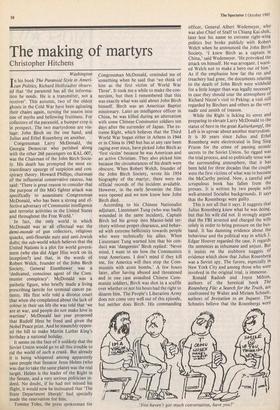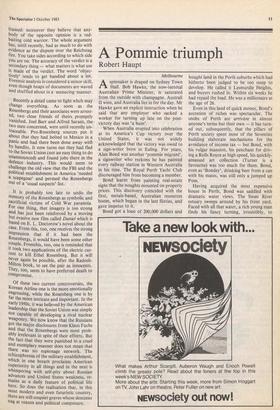The making of martyrs
Christopher Hitchens
Washington Tn his book The Paranoid Style in Ameri- can Politics, Richard Holfstadter observ- ed that 'the paranoid has all the informa- tion he needs. He is a transmitter, not a receiver'. This autumn, two of the oldest ghosts in the Cold War have been agitating their chains again, turning the season into one of myths and bellowing fruitiness. For collectors of the paranoid, a bumper crop is in prospect. The two martyrdoms are vin- tage: John Birch on the one hand, and Julius and Ethel Rosenberg on another.
Congressman Larry McDonald, the Georgia Democrat who perished along with the other 268 passengers on KAL-007, was the Chairman of the John Birch Socie- ty. His death has prompted the most ex- traordinary upsurge of suspicion and con- spiracy theory. Howard Phillips, chairman of the influential conservative caucus, has said: 'There is great reason to consider that the purpose of the MiG fighter attack was specifically to assassinate Congressman McDonald, who has been a strong and ef- fective adversary of Communist intelligence and terrorist activities in the United States and throughout the Free World.'
In fact, the only world in which McDonald was at all effectual was the demi-monde of gun collectors, religious quacks, anti-flouride nuts and anti-Jewish dolts; the sub-world which believes that the United Nations is a plot for world govern- ment (why else did Alger Hiss work on its inception?) and that, in the words of Robert Welch, founder of the John Birch Society, General Eisenhower was a 'dedicated, conscious agent of the Com- munist conspiracy'. McDonald was a pathetic figure, who briefly made a living prescribing laetrile for terminal cancer pa- tients. His first wife told a divorce court that when she complained about the lack of colour in their sex life she was told that 'we are at war, and people do not make love in wartime'. McDonald last year proposed that Rudolf Hess be freed and given the Nobel Peace prize. And he staunchly oppos- ed the bill to make Martin Luther King's birthday a national holiday.
It seems on the face of it unlikely that the Soviet Union would go to all this trouble to rid the world of such a crank. But already it is being whispered among apparently sane people that Senator Jesse Helms (who was due to take the same plane) was the real target. Helms is the leader of the Right in the Senate, and a very serious politician in- deed. No doubt, if he had not missed his flight, it would now be insinuated that 'The State Department liberals' had specially made the reservation for him.
Tommy Toles, the press spokesman for Congressman McDonald, reminded me of something when he said that 'we think of him as the first victim of World War Three'. It took me a while to make the con- nection, but then I remembered that this was exactly what was said about John Birch himself. Birch was an American Baptist missionary. Later an intelligence officer in China, he was killed during an altercation with some Chinese Communist soldiers ten days after the surrender of Japan. The ex- treme Right, which believes that the Third World War began either in Athens in 1944 or in China in 1945 but has at any rate been raging ever since, have picked John Birch as 'first victim' because he was American and an active Christian. They also picked him because the circumstances of his death were obscure. When Robert Welch, founder of the John Birch Society, wrote his 1954 biography of the martyr, there were no official records of the incident available. However, in the early Seventies the files were opened and we now know how John Birch died.
According to his Chinese Nationalist adjutant, Lieutenant Tung (who was badly wounded in the same incident), Captain Birch led his group into Maoist-held ter- ritory without proper clearance, and behav- ed with extreme bellicosity towards people who were technically his allies. When Lieutenant Tung warned him that his con- duct was 'dangerous' Birch replied: 'Never mind, I want to see how the Communists treat Americans. I don't mind if they kill me, for America will then stop the Com- munists with atom bombs.' A few hours later, after having abused and threatened and in one case assaulted Chinese Com- munist soldiers, Birch was shot in a scuffle over whether or not his hosts had the right to disarm him. The People's Liberation Army does not come very well out of this episode, but neither does Birch. His commanding
officer, General Albert Wedemeyer, who was also Chief of Staff to Chiang Kai-shek, later lent his name to extreme right-wing politics but broke publicly with Robert Welch when he announced the John Birch Society. 'I knew Birch as a captain in China,' said Wedemeyer. 'He provoked the attack on himself. He was arrogant. I warn- ed Welch not to make a hero, out of him.' As if the emphasise how far the rot and treachery had gone, the documents relating to the death of John Birch were withheld for a little longer than was legally necessary in case they should sour the atmosphere of Richard Nixon's visit to Peking: a visit still regarded by Birchers and others as the very nadir and zenith of treason.
While the Right is licking its sores and preparing to elevate Larry McDonald to the status of hero in the great Kulturkampf, the Left is in uproar about another martyrdom. It is 30 years since Julius and Ethel Rosenberg were electrocuted in Sing Sing Prison for the crime of passing atomic secrets to the Soviet Union. So rigged was the trial process, and so politically tense was the surrounding atmosphere, that it has been held for three decades that the couple were the first victims of what was to become the McCarthy period. Now, a careful and scrupulous book has fallen from the presses. It is written by two people with well-attested Socialist backgrounds. It says that the Rosenbergs were guilty.
This is not all that it says. It suggests that Julius Rosenberg knew what he was doing, but that his wife did not. It strongly argues that the FBI arrested and charged the wife solely in order to bring pressure on the hus- band. It has damning evidence about the behaviour and the political way in which J. Edgar Hoover regarded the case. It regards the sentences as inhumane and unjust. But it insists on the stubborn nuggets of evidence which show that Julius Rosenberg was a Soviet spy. The furore, especially in New York City and among those who were involved in the original trial, is immense.
Ronald Radosh and Joyce Milton, authors of the heretical book The Rosenberg File: a Search for the Truth, are confronted by Walter and Miriam Schneir, authors of Invitation to an Inquest. The Schneirs believe that the Rosenbergs were 'You haven't got much conversation, have you?'
framed: moreover they believe that any- body of the opposite opinion is a red- baiting cold warrior. The whole argument has, until recently, had as much to do with evidence as the dispute over the Reichstag fire. You take sides according to which side you are on. The accuracy of the verdict is a secondary thing — what matters is what use Is made of the verdict. The word 'objec- tively' tends to get bandied about a lot. Forensic analysis is considered a minor skill, even though heaps of documents are waved and shuffled about in a menacing. manner.
Recently a detail came to light whch may change everything. As soon as the Rosenbergs and their associates were arrest- ed, two close friends of theirs promptly vanished. Joel Barr and Alfred Sarant, the two men concerned, were until recently un- traceable. Pro-Rosenberg sources put it about that they had bolted to Mexico in a Panic and had there been done away with by bandits. It now turns out they had fled to the Soviet Union (not an easy thing to do unannounced) and found jobs there in the defence industry. This would seem to challenge the old view that the FBI and the political establishment in America 'needed a scapegoat' and permed the Rosenbergs out of a 'usual suspects' list.
It is probably too late to undo the memory of the Rosenbergs as symbolic and sacrificial victims of Cold War paranoia. For one thing, ther imagery is too strong and has just been reinforced by a moving but evasive new film called Daniel which is based on E. L. Doctorow's novel about the case. From this, too, one receives the strong impression that if it had been the Rosenbergs, it would have been some other couple. Fromthis, too, one is reminded that it took two applications of the electric cur- rent to kill Ethel Rosenberg. But it will never again be possible, after the Radosh- Milton book, to see the pair as innocents. They, too, seem to have preferred death to compromise.
Of these two current controversies, the Korean Airline one is the more emotionally engrossing, while the Rosenberg one is by far the more intricate and important. In the early 1950s, it was believed by the American leadership that the Soviet Union was simply not capable of developing a rival nuclear weaponry. We now know that the Russians got the major disclosures from Klaus Fuchs and that the Rosenbergs were most prob- ably irrelevant in spite of their efforts. But the fact that they were punished in a cruel and exemplary manner does not mean that there was no espionage network. The schizophrenia of the military establishment, which in one breath proclaims American superiority in all things and in the next is whimpering with self-pity about Russian advances and United States weakness, re- mains as a daily feature of political life here. So does the realisation that, in this most modern and even futuristic country, there are still unquiet graves whose denizens nag at reason and political composure.







































 Previous page
Previous page